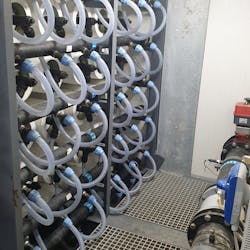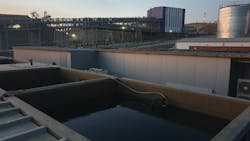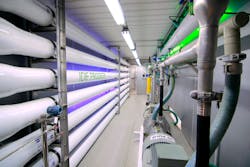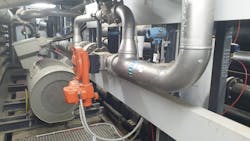SWRO unit ensures high-quality water for OTEKO’s new cargo terminal at the Taman Seaport
In the early 2000s, the OTEKO Group of companies began to develop an ambitious project for the construction of a sea cargo port on the Taman Peninsula in the Krasnodar Territory in Russia. The creation of a deep-water port made it possible to significantly increase the port capacities available in the Azov-Black Sea basin and realize the existing export potential.
Due to its favorable geographical position at the intersection of international transport corridors connecting Russia with the countries of the Mediterranean, the Middle East, North Africa, and South and Southeast Asia, the new cargo port in Taman has significant competitive advantages.
Fairly early in the project development, OTEKO made a strategic decision to implement a completely new large investment project — the construction of multi-purpose infrastructure and marine terminals for the shipment of oil products and liquefied petroleum gases (LPG), bulk cargo, and grain crops. At the beginning of 2018, total investments by the holding amounted to more than US$3.5 billion, allowing OTEKO to be considered the largest private investor in the port infrastructure of southern Russia.
To prevent coal dust being carried by the wind, coal piles are sprayed with water. However, seawater cannot be used as the residual salt causes a decrease in value of the quarried substance. The need to utilize exceedingly high-quality water to spray its coal piles led OTEKO to examine a number of options, including laying down an extensive pipeline to connect with existing water infrastructure. After finalizing preliminary research, the OTEKO team realized that the most economic and time-efficient option would be SWRO.
The system it selected comprises two chemical-free IDE PROGREEN™ desalination units that produce 11,000 m3/d of drinking quality water. Stringent local regulation pertaining to chemical and metal discharge to the sea made the chemical-free solution the natural choice, while IDE’s Modular Prefabricated Design (MPD) enabled a quick, hassle-free, and smooth construction, which met the client’s tight schedule. Due to the plug-and-play nature of IDE’s MPD solutions, construction was wrapped up in a mere seven months.
The proprietary, chemical-free SWRO desalination technology is based on two innovative principles: chemical-free pretreatment and direct osmosis cleaning.
Chemical-free Pretreatment: This process harnesses nature to generate eco-friendly coagulation. Bio-flocculation is the creation of flocs caused by the reaction between certain bacteria and algae, which excrete a sticky extracellular polymeric substances (EPS). The bio-flocculation process utilizes EPS as glue that coagulates fine suspended solids in seawater and allows the efficient removal of these particles in the media filter (MMF).
Direct Osmosis Cleaning (DOC): This is a patented, automatic process that utilizes natural direct osmosis principles to keep the membranes constantly clean. By equalizing the pressures on both sides of the membrane for a short period of time, DOC allows the osmosis process to backwash the membranes with permeate water, which removes any fouling from the membrane surface.
Results include improved membrane performance and extended lifetime, long-term reduction in energy consumption, uninterrupted operation, stable performance, and chemical-free membrane cleaning, which means there’s no need for periodic Cleaning in Place (CIP).
Desalination in a Box
The modular approach addresses limitations such as remote or geographically challenging locations with limited infrastructure, as well as the need for faster installation.
IDE’s MPD is an end-to-end package that supports maximal completion of all production stages in the workshop, including comprehensive tests under full operational conditions, leaving as little work as possible for the on-site deployment stage.
Designs are perfectly customized for all needs, shapes, and sizes, maximizing savings and pre-production while minimizing project risks, infrastructure investment, and civil work. MPD units are easily accessible for maintenance and enable effortless future expansions. WW







